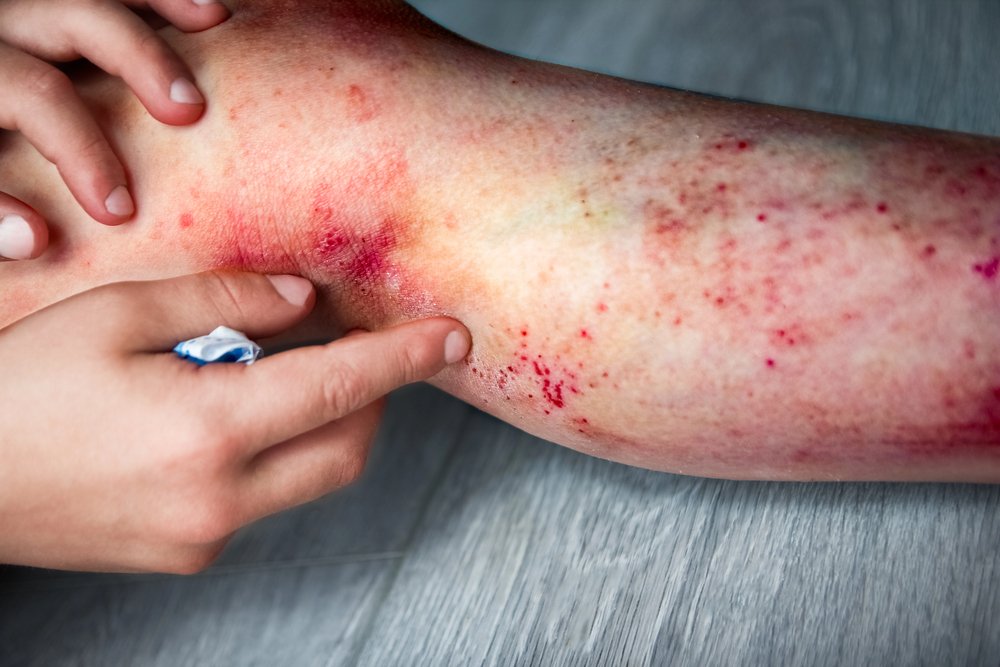Learn
Delve into dermatology diseases with new approaches from conventional to complementary care.
Topics
Explore a broad spectrum of dermatological conditions and topics to enhance your practice.
Training Programs
Expert led instruction for every level of patient care.
Log in to see enrolled program content.
Conferences
Gain practical insights and meet new colleagues.
Hover over a conference to view recordings.
Join Us
The largest integrative dermatology community.
Eczema Causes And Triggers - How To Avoid Them?
Tips to keep eczema from worsening

What Triggers Eczema Flare-Ups?
Eczema is a common inflammatory skin condition that is associated with itchiness and difficulty sleeping, which commonly affect quality of life. It occurs mostly during childhood but can often affect adults. Typically childhood eczema improves with age in 80% of the cases.[1] Eczema is often associated with other conditions like asthma.[2] Multiple things have been found to cause eczema flares, and environmental, dietary, psychological, and lifestyle factors are all considered as some of the potentially modifiable triggers of these flares. Genetics, environment, and weather are some examples of non-modifiable triggers.
Diet
Diet can have a profound correlation with eczema, and it is estimated that it is associated with food allergy or food sensitivities in approximately one-third of children.[3] Cow’s milk, eggs, peanuts, soy, wheat, nuts, and fish are some of the common food allergies in children with eczema.[4] Further research is needed on elimination diets for those with eczema.
Smoking
Lifestyle can play a role in eczema flare-ups. Smoking is one of the modifiable lifestyle choices that can be made. Significantly more smokers suffer from chronic hand eczema than non-smokers,[5] and the association between eczema and depression is higher in smokers than it is in non-smokers.[6] Even pre- and postnatal exposure to second-hand smoke can increase the risk of eczema development later in life.[7]
Stress
Eczema and stress have a fairly understandable connection. The skin is visible to those around us, and any blemish can seem much more prominent than it may actually be. In the case of eczema, not only the visible lesion but also the sensation can have psychological effects. The severe itch sensation can cause anxiety, and patients with eczema generally rate higher on tests that evaluate depression, anxiety, private body consciousness, quality of life, and interaction anxiousness.[8]
Poor Sleep
There is a complex relationship between sleep and eczema. Patients with eczema have a higher chance of regular insomnia.[9] Poor sleep can lead to a worsening of itch sensation and more scratching events at night, possibly due to problems with temperature regulation within the body.[10] Even the parents of children with eczema suffer from sleep disruptions.[11]
Environmental Factors
Environmental factors, such as dust mites, pollen, and plants like mugwort, birch, and grasses are considered triggers in a number of patients with eczema.[12] Other factors that have been found to trigger eczema flare-ups can include wool,[13] nylon clothing, pets, sweating and the use of shampoo, especially during cold weather.[14]
There is a psychological correlation with eczema that has been defined, showing that depression, anxiety, and stress are associated with the condition.[15] These psychological facets can reduce the quality of life and make healing more difficult.
What Are Ways to Avoid Eczema Flare-Ups?
It is important for people with eczema to first understand what is responsible for the flares they experience. When the source of the flare-ups is found, it can be easier to avoid them. Some of the lifestyle choices may be the simplest of all triggers to avoid, but others can be quite difficult. Clothing-induced flares can be prevented simply by not wearing or coming in contact with that type of clothing. Hygiene and personal care products can be avoided if they are the triggers. Shampoo use can be minimized or substituted with a gentler type in order to prevent future flares.
Diet
If the eczema flares are suspected to be caused by a food allergy or sensitivity, it is best that they are identified with an oral food challenge or through skin testing. Once they have been identified they can be eliminated from the diet, which can often result in dramatic improvement of symptoms.[16]
Smoking
A difficult trigger to remove from the lifestyle is smoking. Tobacco smoking can be one of the most difficult things to quit, but can often be one of the most beneficial for health. In addition to the benefits that quitting can have on the heart and lungs, smoking cessation can be important to the health of the skin.[17]
Stress
Many different forms of management exist to control flares that are caused by psychological stress.
Sleep
Sleep can be improved by many things. Pharmaceuticals, natural products, relaxation techniques, and stress relief methods are just some of the things that can be used to improve sleep. If poor sleep is caused by itching, there are also multiple approaches that can be used to improve that symptom.
Environment
Although it may be a difficult choice, it may be necessary to consider removing a pet from the home if that pet is the source of the flare. The difficulties of trigger avoidance come with the uncontrollable environmental factors. Dust can be controlled through regular cleaning but continues to affect those people whose eczema is worsened by that dust. One study demonstrates that avoidance of indoor allergen exposure is only effective when allergenic foods are also avoided.[18] Pollen, grasses, and other plants are more difficult to avoid, especially if parts of those plants are airborne.
Overall, flares of eczema can be caused by a number of controllable and non-controllable factors. Knowledge of triggers may be one of the most important aspects to manage eczema symptoms. When you understand the cause of a flare, you can then make the necessary changes to avoid or minimize contact with that trigger.
References
- Dangoisse C. [Atopic dermatitis]. Rev Med Brux.2011;32(4):230-234; PMID: 22034750 Link to research.
- Demehri S, Morimoto M, Holtzman MJ, et al. Skin-derived TSLP triggers progression from epidermal-barrier defects to asthma. PLoS Biol.2009;7(5):e1000067; PMID: 19557146 Link to research.
- Zuniga R, Nguyen T. Skin conditions: common skin rashes in infants. FP Essent.2013;407:31-41; PMID: 23600337 Link to research.
- Bergmann MM, Caubet JC, Boguniewicz M, et al. Evaluation of food allergy in patients with atopic dermatitis. J Allergy Clin Immunol Pract.2013;1(1):22-28; PMID: 24229818 Link to research.
- Molin S, Ruzicka T, Herzinger T. Smoking is associated with combined allergic and irritant hand eczema, contact allergies and hyperhidrosis. J Eur Acad Dermatol Venereol.2015;29(12):2483-2486; PMID: 25405274 Link to research.
- Yang YW, Chen YH, Huang YH. Cigarette smoking may modify the risk of depression in eczema among adults: a preliminary study using NHANES 2005-2006. J Eur Acad Dermatol Venereol.2011;25(9):1048-1053; PMID: 21114687 Link to research.
- Thacher JD, Gruzieva O, Pershagen G, et al. Pre- and postnatal exposure to parental smoking and allergic disease through adolescence. Pediatrics.2014;134(3):428-434; PMID: 25136039 Link to research.
- Oh SH, Bae BG, Park CO, et al. Association of stress with symptoms of atopic dermatitis. Acta Derm Venereol.2010;90(6):582-588; PMID: 21057740 Link to research.
- Silverberg JI, Garg NK, Paller AS, et al. Sleep disturbances in adults with eczema are associated with impaired overall health: a US population-based study. J Invest Dermatol.2015;135(1):56-66; PMID: 25078665 Link to research.
- Camfferman D, Short MA, Kennedy JD, et al. Thermoregulation, scratch, itch and sleep deficits in children with eczema. Sleep Med.2016;25:145-150; PMID: 27823708 Link to research.
- Meltzer LJ, Moore M. Sleep disruptions in parents of children and adolescents with chronic illnesses: prevalence, causes, and consequences. J Pediatr Psychol.2008;33(3):279-291; PMID: 18084038 Link to research.
- Darsow U, Ring J. [Atopic patch test. Atopic eczema and allergy]. Hautarzt.2003;54(10):930-936; PMID: 14513239 Link to research.
- Ricci G, Patrizi A, Bellini F, et al. Use of textiles in atopic dermatitis: care of atopic dermatitis. Curr Probl Dermatol.2006;33:127-143; PMID: 16766885 Link to research.
- Langan SM. Flares in childhood eczema. Skin Therapy Lett.2009;14(8):4-5; PMID: 20054505 Link to research.
- Hon KL, Pong NH, Poon TC, et al. Quality of life and psychosocial issues are important outcome measures in eczema treatment. J Dermatolog Treat.2015;26(1):83-89; PMID: 24552300 Link to research.
- Caubet JC, Eigenmann PA. Allergic triggers in atopic dermatitis. Immunol Allergy Clin North Am.2010;30(3):289-307; PMID: 20670814 Link to research.
- Freiman A, Bird G, Metelitsa AI, et al. Cutaneous effects of smoking. J Cutan Med Surg.2004;8(6):415-423; PMID: 15988548 Link to research.
- Capristo C, Romei I, Boner AL. Environmental prevention in atopic eczema dermatitis syndrome (AEDS) and asthma: avoidance of indoor allergens. Allergy.2004;59 Suppl 78:53-60; PMID: 15245359 Link to research.
Related Articles

Atopic Dermatitis
Atopic Dermatitis Case Discussion with Dr. Peter Lio

Atopic Dermatitis
Navigating the Complexities of Atopic Dermatitis and Prurigo Nodularis: A Clinical Toolkit for Practitioners

Atopic Dermatitis
Navigating Atopic Dermatitis and Hand & Foot Dermatitis




